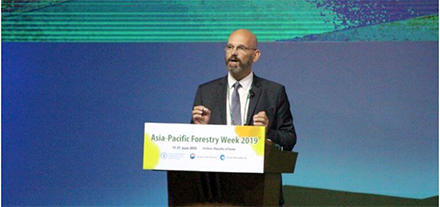
Ben Gunneberg
Empowering communities, managing landscapes and lifting millions from poverty are among key benefits underpinning PEFC forest certification. Speaking at the Asia-Pacific Forestry Week (APFW2019) in South Korea, PEFC International CEO, Ben Gunneberg challenged participants to celebrate the values underpinned by PEFC forest certification. Source: Timberbiz
“These are the direct, known benefits. But it is the lesser known, indirect benefits of forest certification which contribute to our well-being, better collaboration and ultimately, peace,” Mr Gunneberg said.
Reflecting on the importance of forest certification in lifting communities out of poverty, Mr Gunneberg stressed the important role certification plays in building trust and confidence between different groups.
“Forest certification gets people together to talk, challenge each other, explore and find solutions for problems at all levels – locally, regionally, nationally and internationally. It can also help to pull people out of poverty by giving new income generation opportunities,” he said.
“Certification builds trust and confidence between different interests through consensus and conflict resolution processes, which are the basis for ensuring and maintaining peace at all levels.”
Hosted by the Korea Forest Service (KFS), together with the Food and Agriculture Organization of the United Nations (FAO), the theme of APFW2019 was ‘Forests for Peace and Well Being.’
Reflecting on the role of forest certification in advancing communities, Mr Gunneberg highlighted the global reach of certification.
“Take a look at Indonesia. The indirect benefits of seeking sustainable solutions for rural communities has enabled communities to cultivate a range of non-wood forest products for food security and community welfare,” he said.
“There has also been a 95% reduction of the areas burned by smallholders, because companies gave them agricultural machinery to prepare the land. This has reduced respiratory disease in children and the elderly, and improved urban neighbourhoods in Singapore who were suffering from the haze.
“Forest certification is about co-operation for practical, implementable solutions at all levels, and about partnerships through local dialogue between communities and interests.
“It is also about well-being, from fair wages to gender equality, as well as capacity building, education and training for sustainable livelihoods.
“Forest certification is more than just sustainable forest management,” Ben concluded. “It’s about collaboration of people to enable ongoing dialogue, conflict resolution and problem solving at all levels for peace.”
PEFC is the world’s largest forest certification scheme with more than 310 million hectares of defined forest under certification across more than 51 countries.
In Australia, the Responsible Wood certification scheme is internationally endorsed and mutually recognised by PEFC International.





